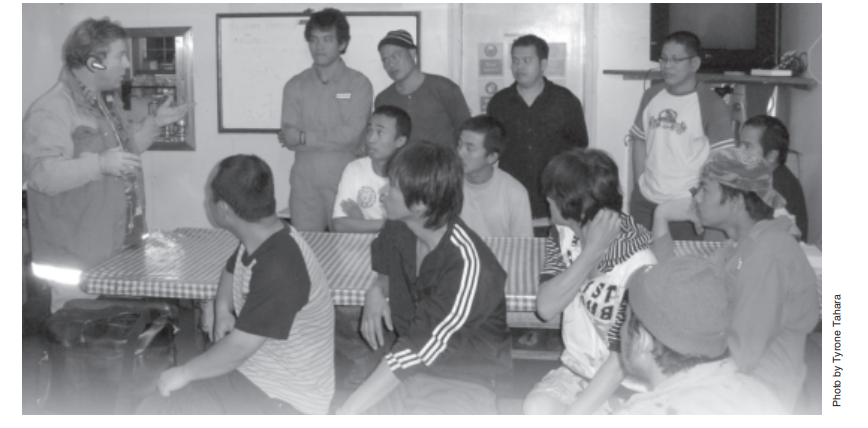
Solidarity and action by ILWU members in Hawaii helped score a Christmas-time victory for a group of exploited merchant mariners late last year. The crew of 20 from the small tanker, Japan Tuna #3, arrived at the islands after a lengthy voyage deep into the tropical Pacific where their ship provides fuel and supplies for a commercial tuna fishing fleet that remains at sea for months at a time. Years of low pay and discrimination finally moved crewmembers to sign a petition that was delivered to U.S. Coast Guard officials when the ship docked in Hawaii. A Coast Guard Lt. Commander contacted ILWU-member Jeff Engels who coordinates work on the West Coast for the International Transport Workers Federation (ITF)—a global network of unions that includes the ILWU.
Last March, Engels conducted a training in Hawaii for volunteers from Local 142 longshore and the IBU who wanted to learn how to respond to incidents like the one that was now unfolding in Honolulu. Engles also met with Coast Guard officials in Hawaii, and it complained about conditions aboard the Japan Tuna. ILWU International President Bob McEllrath and Vice President for Hawaii, Wesley Furtado, were contacted by Engels to review the action plan. Engels then called Local 142 Business Agent Tyrone Tahara and IBU Regional Director Warren Ditch, who, along with Local 142 longshoremen Brad Scott, Dennis Morton, and Sean Dacuycuy, had all attended last year’s training session.
The Hawaii team quickly decided they should visit with the Japan Tuna crew to gather evidence and provide moral support. After Engels called the Japan Tuna’s management company in Singapore to explain that the crew wanted a union contract, he boarded the next flight to Hawaii.
The Japan Tuna’s crewmembers came from the Philippines, Korea, and China, but they had no problem making their demands clear for better pay, an end to discrimination, and insistence on a contract. Word about the crew’s desire for a union contract spread quickly on the waterfront by word-of-mouth and through the Ports Council that helps coordinate efforts between Hawaii’s waterfront unions. The company felt pressure from inquiries that were
—Continued on page 8
Credit crisis cuts into global shipping
At the Port of Los Angeles, 7.3 million containers moved across the docks from January through November, down more than 5 percent. The drop was bigger in Long Beach, with 6 million containers moving through the port, down about 10 percent.
On both coasts of the U.S. and in the Gulf, ports that were expecting continued growth in ships packed with Asian imports are instead seeing sharp declines in imports and exports.
The once booming container traffic from Asia has slowed dramatically as the bad news in the financial markets cause US and European consumers to cut back on their spending. With less demand for finished products, exports of raw materials have also fallen.
A shortage of credit has also taken a toll on global shipping. As much as 90 percent of international trade relies on letters of credit, trade insurance, and other forms of commercial IOUs that transfer payments to suppliers and shippers once the goods are delivered.
World credit is in short supply as international banks are hoarding their cash to cover losses from the billions of dollars of mortgage-backed securities they bought from the US. To make more credit available, many European and Asian governments are injecting cash into their financial systems by buying preferred stocks in their banks.
With cargo bookings down, shipping companies are cutting rates, reducing their capacity, and laying up ships. APL and its partners plan to take 60 ships out of service. To make matters worse, a record number of newly constructed ships with a total capacity of 1.6 million TEUs are scheduled to be delivered in 2009.
The over capacity will start fare wars, loss of revenues, and will likely force weaker shipping lines to merge or go out of business.
How the economic crisis affects us
Most economic forecasts, including that of the Federal Reserve Bank, predict the U.S. economy will remain in recession throughout 2009 and may begin a slight recovery around the middle of 2010 with modest growth in 2011.
The U.S. economy goes into recession about once every 10 years and usually recovers in one or two years. Past recessions have also been milder for Hawaii than other states, because military spending continues and Japanese visitors make up for declines in mainland visitors.
This recession, however, is worldwide and will lead to declines in both Japanese and mainland visitors. This recession also threatens to be more serious and last longer than any other recession since the so-called Great Depression which lasted ten years from 1929 to 1939.
The slowdown in economic activity and tourism means smaller paychecks for Hawaii workers and less tax revenues collected by the State and Counties. It also means the union’s income has fallen because members are paying less union dues.
This means the State, Counties, and the union must be prepared to cut expenses and operate with less income for two or more years. While the state may raise some fees, the ILWU’s officers will not be asking for a dues increase.
The ILWU officers have been cutting expenses for several years, and the union’s spending is actually less than it spent in 2003. The one
Continued on page 6
